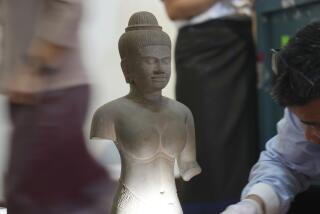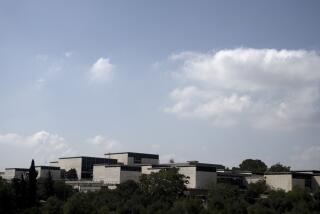Most Pre-Islamic Relics Destroyed, Taliban Says
- Share via
KABUL, Afghanistan — Despite pleas from an outraged world, Afghanistan’s ruling Taliban has destroyed most of the ancient relics from the nation’s pre-Islamic past, including parts of two towering statues of Buddha, Taliban officials said Saturday.
By Monday--a week after the Taliban’s reclusive leader, Mullah Mohammed Omar, ordered all statues destroyed--the task will be complete, Information Minister Qadratullah Jamal said.
“Two-thirds of all the statues in Afghanistan have already been destroyed. The remaining will be destroyed in the next two days,” he said.
Using explosives, rockets and heavy artillery, Taliban soldiers blasted away at the two ancient statues of Buddha hewn from a cliff face in central Bamian province in the 3rd and 5th centuries.
“The head and legs of the Buddha statues in Bamian were destroyed yesterday,” Jamal said. “Our soldiers are working hard to demolish their remaining parts. They will come down soon. We are using everything at our disposal to destroy them.”
The two Buddhas, 175 and 120 feet tall, were damaged in fighting. Witnesses who have climbed to the top of the Buddha statues say Russian soldiers carved their names in the statues after the Soviet invasion of Afghanistan, which began in 1979.
Caves at the foot of the statues had become home to families of refugees and a place for soldiers to stash their weapons.
One of the statues is thought to be the world’s tallest of a Buddha standing rather than sitting.
The destruction began after Omar ruled that they were idolatrous and against the tenets of Islam. Others say Islam does not ban images, only the worship of them.
A special representative of UNESCO met with the Taliban’s ambassador to neighboring Pakistan on Saturday to register the world’s outrage.
Pierre Lafrance said the destruction of the statues only will worsen the Taliban’s already troubled relations with the world community.
But Taliban Ambassador Abdul Salam Zaeef said the order could not be reversed.
The Taliban says there is no place for statues in an Islamic country.
The Taliban religious militia, which rules 95% of Afghanistan, including the capital Kabul, adheres to a strict brand of Islamic law. Its interpretation has been questioned by Islamic scholars in other Muslim countries and Islamic institutions.
But the Taliban has been unmoved by international appeals to save the statues--even those from fellow Muslim nations, including its closest ally, Pakistan.
An estimated 6,000 statues were housed in the Kabul museum. It’s believed most have been destroyed, although the Taliban has refused to allow anyone inside the war-ravaged building.
More to Read
Sign up for Essential California
The most important California stories and recommendations in your inbox every morning.
You may occasionally receive promotional content from the Los Angeles Times.










